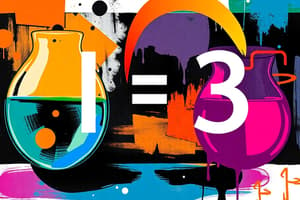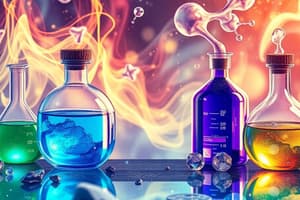Podcast
Questions and Answers
A researcher consistently observes that a specific chemical reaction produces the same result under identical conditions. According to the principles of the scientific method, what is the MOST appropriate next step?
A researcher consistently observes that a specific chemical reaction produces the same result under identical conditions. According to the principles of the scientific method, what is the MOST appropriate next step?
- Develop a theory that explains the underlying causes of the observed reaction.
- Publish the results immediately, as consistent results imply a significant discovery.
- Formulate a law that describes the observed behavior without explaining why it occurs. (correct)
- Design new experiments to test the limits of the observed behavior and identify potential exceptions.
Which of the following BEST describes the relationship between a scientific theory and a scientific law?
Which of the following BEST describes the relationship between a scientific theory and a scientific law?
- A scientific law is a well-tested theory that has been proven to be true, while a theory is a tentative explanation.
- A scientific theory explains _why_ a phenomenon occurs, while a scientific law predicts _what_ will happen. (correct)
- A scientific theory and a scientific law are essentially the same, but a theory is more widely accepted within the scientific community.
- A scientific law is more comprehensive than a theory and incorporates multiple theories into a single framework.
A chemist is trying to understand why a particular reaction rate changes with different catalysts. Which approach would be the MOST effective FIRST step in applying the scientific method?
A chemist is trying to understand why a particular reaction rate changes with different catalysts. Which approach would be the MOST effective FIRST step in applying the scientific method?
- Immediately publish preliminary findings to get feedback from other scientists.
- Declare a law describing the reaction based on a single catalyst experiment to expedite the research process.
- Perform experiments to carefully measure the reaction rate with a variety of different catalysts. (correct)
- Formulate a theory about how the catalysts are affecting the reaction at a molecular level.
In the scientific method, what is the primary role of formulating a hypothesis?
In the scientific method, what is the primary role of formulating a hypothesis?
A scientist observes a new phenomenon that contradicts an existing, well-established theory. According to the scientific method, what is the MOST appropriate course of action?
A scientist observes a new phenomenon that contradicts an existing, well-established theory. According to the scientific method, what is the MOST appropriate course of action?
Which skill is least directly enhanced by studying Chemistry?
Which skill is least directly enhanced by studying Chemistry?
A scientist observes that a particular chemical reaction releases heat. Which step of the scientific method would this fall under?
A scientist observes that a particular chemical reaction releases heat. Which step of the scientific method would this fall under?
Why is chemistry often referred to as the 'central science'?
Why is chemistry often referred to as the 'central science'?
A researcher formulates a hypothesis that increasing the concentration of a reactant will increase the rate of reaction. What is the next step in the scientific approach?
A researcher formulates a hypothesis that increasing the concentration of a reactant will increase the rate of reaction. What is the next step in the scientific approach?
Which of the following is an example of using chemistry to develop new energy sources?
Which of the following is an example of using chemistry to develop new energy sources?
Which activity best represents 'finding patterns in information' within the context of chemistry?
Which activity best represents 'finding patterns in information' within the context of chemistry?
A chemist is trying to improve the yield of a chemical reaction. After conducting several experiments, they notice that increasing the temperature consistently leads to a higher yield. According to the scientific method, what should the chemist do next?
A chemist is trying to improve the yield of a chemical reaction. After conducting several experiments, they notice that increasing the temperature consistently leads to a higher yield. According to the scientific method, what should the chemist do next?
A pharmaceutical company is developing a new drug. After initial testing, they observe some undesirable side effects. Using the scientific approach, what should they do?
A pharmaceutical company is developing a new drug. After initial testing, they observe some undesirable side effects. Using the scientific approach, what should they do?
Flashcards
Qualitative Observations
Qualitative Observations
Descriptions using your senses (sight, smell, touch, taste, hearing).
Quantitative Observations
Quantitative Observations
Observations involving numerical data and measurements.
Hypothesis
Hypothesis
A testable explanation for observed characteristics or behaviors.
Theory
Theory
Signup and view all the flashcards
Law
Law
Signup and view all the flashcards
Chemistry
Chemistry
Signup and view all the flashcards
Gathering Information
Gathering Information
Signup and view all the flashcards
Finding Patterns
Finding Patterns
Signup and view all the flashcards
Analyzing Complex Systems
Analyzing Complex Systems
Signup and view all the flashcards
Predicting Future Events
Predicting Future Events
Signup and view all the flashcards
Systematic Approach
Systematic Approach
Signup and view all the flashcards
Experiments
Experiments
Signup and view all the flashcards
Study Notes
- Basic Chemistry: A Foundation by Steven S. Zumdahl from the University of Illinois.
Chemistry: An Introduction
- Chapter 1 introduces the basics of chemistry.
Why is Chemistry Important?
- Chemistry is important because it is key to understanding new materials, pharmaceuticals and energy sources.
- Chemistry is important as it is crucial for food supplies.
- Chemistry aids in learning to gather and organize information, both qualitatively (descriptions) and quantitatively (measurements).
- It helps to identify patterns, analyze complex systems and predict future events by understanding behaviors.
- Chemistry enhances problem-solving capabilities as it is a systematic approach.
- Chemistry deals with the natural world.
What is Chemistry?
- Deals with the materials of the universe and their changes.
- Regarded as the central science; essential for grasping most other scientific fields.
Solving Problems Using a Scientific Approach
- Define the problem by gathering information (facts and observations).
- Propose solutions by organizing information and identifying patterns to form hypotheses.
- Evaluate proposed solutions to create experiments and test patterns.
The Scientific Method
- Involves a process of studying natural phenomena.
- This process includes observations, forming laws and theories, and testing those theories through experimentation.
- Consists of making qualitative (descriptive) and quantitative (measurable) observations.
- Involves formulating hypotheses that provide explanations for observed characteristics or behaviours.
- Perform experiments for testing hypotheses.
- Repeat to get a well-tested explanation.
- Theory is a set of assumptions to explain some aspect of an observation.
- Theories may need to be modified or discarded as new information is discovered.
- Law is a generally observed behavior without explanation as to why the behavior occurs.
Theory vs Law
- Laws predict what will happen.
- Theories explain why something happens and will also allow you to predict what will happen.
- The scientific method includes making an observation, formulating a hypothesis, conducting an experiment, formulating a theory, generating a prediction, and carrying out a further experimen
The Best Approach to Learning Chemistry
- Learning the vocabulary of chemistry by defining terms and understanding how common vocab is applied to chemistry.
- Memorizing important information such as Names, Formulas and Charges of Polyatomic Ions and Solubility Rules.
- Learning and practicing processes such as Systematic Names and Formulas and Dimensional Analysis.
- Reviewing and working through questions and exercises at the end of the chapter to test understanding.
- Reviewing and working through questions and exercises helps to identify behavior patterns.
Studying That Suits You
Use AI to generate personalized quizzes and flashcards to suit your learning preferences.



